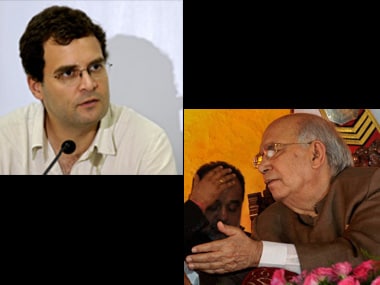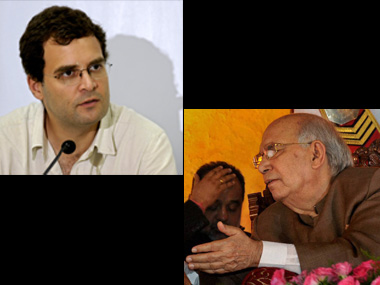“Rahul flip flops on Bhatta-Parsaul facts” reads an IBNLive
headline
. It’s just one of the many news stories taking the young Gandhi scion to task for making wild allegations about rape and genocide in Uttar Pradesh. The foot-in-mouth episode has become so embarrassing that the Congress spokesperson Janardan Dwivedi is now blaming the media: “The media reports are wrong. How the ashes became corpse we don’t know how. We don’t know how it became 74 bodies. It’s wrong reporting.” Right, those reporters made me say it! [caption id=“attachment_12448” align=“alignleft” width=“380” caption="(from left) Congress general secretary Rahul Gandhi (Reuters) and Karnataka Governor HR Bhardwaj (PTI). Are they taking the right steps?"]
 [/caption] In distant Karnataka, however, the resident governor doesn’t need to humiliate himself in this fashion. H. R. Bhardwaj over the course of 24 hours, has gone from being B. S. Yeddyurappa’s sworn enemy to his dearest pal. The man who recommended president’s rule days earlier was spotted yesterday “laughing and whispering” with the Chief Minister – the guy who’d just returned from Delhi after petitioning the President to kick him out of his job. Yet the Times of India headline merely
notes
: “Bhardwaj now says ‘friend’ BSY has massive majority.” The governor’s turnaround isn’t merely a flip-flop but full-on somersault. So why does one political “adjustment” attract more flak than the other? For all the hue and cry raised by the Mayawati government, it isn’t clear whether Gandhi is guilty of political cupidity – of foolishly latching on to confused, unverified testimonies – or of making the entire thing up. The Indian Express’
attempt
to determine exactly what the villagers said to him is both amusing and revealing. “Rahulji ne us din bahut kuchh dekha tha, tabhi thoda confuse ho gaye honge. Kisan log koi Govardhan Parvat thodi banaa sakte hain (Rahul saw so many things that day, he must have got a little confused. Farmers cannot raise a Govardhan Mountain),” says Hazari Lal, a brother of one of the two farmers killed in clashes with police. But as the report makes clear, there is plenty of confusing information floating about. One woman tells the reporter that a fellow resident has lost his three kids in a police attack. Yet a visit to his house reveals the entire family safe and sound. Perhaps Hazari Lal does have it right, though Gandhi’s ‘confusion’ was clearly fuelled by his personal calculations. Irrespective of his motives, all this misstep does is to muddy the situation further, deflecting attention from the real issue at hand. The UP government’s land grab – which briefly shot into the spotlight because of Rahul’s drive-by photo-op – has receded yet again into the background. This obsession with who said what is all the more curious in a political culture where talk has always been cheap. A dewy-eyed Bhardwaj told reporters, “The CM has a massive majority; there is no doubt about it. It must be understood that the CM is the elected representative of the state, and there is no dispute about his majority. He works 18 to 20 hours a day. We are friends.” See, they secretly really, really liked each other, but pretended to really, really hate each other, until fate and the mean old Congress party forced them to fall into each other’s arms. It’s a Bollywood romance! Or just Indian politics as usual. The truth is that Gandhi’s self-serving flip-flop pales in comparison with the shameless cartwheels that are now routine in our democracy. These lies become ‘important’ only when they carry weight in the great electoral calculus of power. Bhardwaj’s about-face is inconsequential because the Congress party isn’t interested in taking the BJP on over Yeddyurappa or corruption – for the obvious pot-and-kettle reasons. What Bhardwaj says or does matters little. Neither do BSY’s long, well-documented crimes of governance. In Uttar Pradesh, however, Gandhi’s every word counts in a heated battle between two heavyweights looking for electoral advantage. If all goes according to Bhardwaj’s plan to save his backside – and Yeddyurappa plays along – his turnaround will soon be yesterday’s news. But Rahul’s error will be deemed important as long as the war between BSP and the Congress endures through the 2012 Assembly elections. Lies matter only when they can be turned to political advantage for the other party. In a recent Open magazine
essay
, Hartosh Singh Bal argues that this insistence on a politics of ideas is a middle-class preoccupation. For the vast poor masses who turn out to vote, elections represent their sole avenue to procure basic benefits that the rest of us take for granted:
[/caption] In distant Karnataka, however, the resident governor doesn’t need to humiliate himself in this fashion. H. R. Bhardwaj over the course of 24 hours, has gone from being B. S. Yeddyurappa’s sworn enemy to his dearest pal. The man who recommended president’s rule days earlier was spotted yesterday “laughing and whispering” with the Chief Minister – the guy who’d just returned from Delhi after petitioning the President to kick him out of his job. Yet the Times of India headline merely
notes
: “Bhardwaj now says ‘friend’ BSY has massive majority.” The governor’s turnaround isn’t merely a flip-flop but full-on somersault. So why does one political “adjustment” attract more flak than the other? For all the hue and cry raised by the Mayawati government, it isn’t clear whether Gandhi is guilty of political cupidity – of foolishly latching on to confused, unverified testimonies – or of making the entire thing up. The Indian Express’
attempt
to determine exactly what the villagers said to him is both amusing and revealing. “Rahulji ne us din bahut kuchh dekha tha, tabhi thoda confuse ho gaye honge. Kisan log koi Govardhan Parvat thodi banaa sakte hain (Rahul saw so many things that day, he must have got a little confused. Farmers cannot raise a Govardhan Mountain),” says Hazari Lal, a brother of one of the two farmers killed in clashes with police. But as the report makes clear, there is plenty of confusing information floating about. One woman tells the reporter that a fellow resident has lost his three kids in a police attack. Yet a visit to his house reveals the entire family safe and sound. Perhaps Hazari Lal does have it right, though Gandhi’s ‘confusion’ was clearly fuelled by his personal calculations. Irrespective of his motives, all this misstep does is to muddy the situation further, deflecting attention from the real issue at hand. The UP government’s land grab – which briefly shot into the spotlight because of Rahul’s drive-by photo-op – has receded yet again into the background. This obsession with who said what is all the more curious in a political culture where talk has always been cheap. A dewy-eyed Bhardwaj told reporters, “The CM has a massive majority; there is no doubt about it. It must be understood that the CM is the elected representative of the state, and there is no dispute about his majority. He works 18 to 20 hours a day. We are friends.” See, they secretly really, really liked each other, but pretended to really, really hate each other, until fate and the mean old Congress party forced them to fall into each other’s arms. It’s a Bollywood romance! Or just Indian politics as usual. The truth is that Gandhi’s self-serving flip-flop pales in comparison with the shameless cartwheels that are now routine in our democracy. These lies become ‘important’ only when they carry weight in the great electoral calculus of power. Bhardwaj’s about-face is inconsequential because the Congress party isn’t interested in taking the BJP on over Yeddyurappa or corruption – for the obvious pot-and-kettle reasons. What Bhardwaj says or does matters little. Neither do BSY’s long, well-documented crimes of governance. In Uttar Pradesh, however, Gandhi’s every word counts in a heated battle between two heavyweights looking for electoral advantage. If all goes according to Bhardwaj’s plan to save his backside – and Yeddyurappa plays along – his turnaround will soon be yesterday’s news. But Rahul’s error will be deemed important as long as the war between BSP and the Congress endures through the 2012 Assembly elections. Lies matter only when they can be turned to political advantage for the other party. In a recent Open magazine
essay
, Hartosh Singh Bal argues that this insistence on a politics of ideas is a middle-class preoccupation. For the vast poor masses who turn out to vote, elections represent their sole avenue to procure basic benefits that the rest of us take for granted:
The voter votes not for an idea or an ideology but for the possibility of individual benefit. This possibility is not as straightforward as accounting for the money, a television or alcohol handed out even though each counts. If roads matter, they will be weighed in, it is just that the importance given to each factor varies from individual to individual.
And whether the middle-class likes it or not, this version of democracy “delivers in ways that the elite fails to anticipate. A Mayawati, Mulayam or Lalu are products of such a system … It is difficult to ascribe ideology or even ideas to the politics these three actually practice, but over the past 20 years, they have reshaped Bihar and UP by dismantling the hierarchy of caste.” Maybe so, but this kind of politics, bereft of ideas, turns into a giant electoral circus where anything can be said and done to gain power. No one need stand for anything—or at least not for very long—as long he doles out the right kind of freebies at election time. Robbed of substance, politics becomes entirely about expediency and breeds a cynicism that infects the entire society, including we the media. So it is that in Uttar Pradesh, the central issues of democracy—of justice, accountability, police brutality—have been sidelined by the eternal political game, fought by the parties and refereed by the press. We’re now back to analyzing just who “won” this political round. Never mind the farmers, who may well profit from this set-to between Rahul and Mayawati….or not. The outcome is no different in Karnataka. It’s BSY, game, set, and match. When Bill Clinton ran for president back in 1992, his campaign manager’s motto was “It’s the economy, stupid!” In Indian politics, it’s always the gaddi, stupid.
)